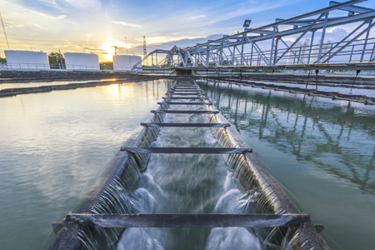How Can The Water Industry Benefit From IoT Technology?
By Sanjeev Verma

The technology of the Internet of Things (IoT) has been a pioneer in developing solutions that are rich in monitoring, analytical, and automation features. These innovative features allow the industry to optimize operational methodologies, boost overall equipment effectiveness, and automate processes that are generally performed manually.
While this cutting-edge technology has already projected its potential in the manufacturing sector and other production centric industries, its benefits are now being apprehended in utilities. IoT has already made some astounding developments in this segment.
The market size of IoT in utility reached a peg of US$28.6 billion in 2019 and is forecasted to reach a market valuation of $53.8 billion in 2024. That’s a compound annual growth rate (CAGR) of 13.5 percent from 2019 and is a clear indicator of the acceptance of the technology in this vertical. Utilities with the features of IoT will be able to eliminate operational inefficiencies, optimize resource utilization, and increase the reach of the services they develop to more end consumers.
While the IoT has uplifted the utility segment of oil & gas and energy, the advent of this technology is now clearly visible in water industries and sewage management. The solutions developed through this technology can be expected to form long-reverberating ripples that will help these sectors immensely.
However, before we discuss the applications of IoT for water utilities and sewage treatment, let us discuss the need for IoT in these segments.
Why IoT For Water Industry?
The global population is growing at an uncontrollable rate. The population has multiplied 4 times from what it was 100 years ago. With limited resources for fresh and drinkable water, it is very difficult for water producers of different countries to supply potable water to the ever-growing population.
Additionally, water utilities and wastewater treatment facilities still operate on legacy systems that restrict them to boost the production rate and cater to the increasing needs. The lack of monitoring systems and analytics tools along with the workforce-dependent operations refrain them from enhancing their efficiency and detect loopholes that can be mitigated to increase the supply of potable water cost-effectively.
Let us now look at some of the applications of IoT in the water industry:
Level Monitoring
One of the many applications of IoT that is quite prevalent in many industries dealing with liquid products is tank level monitoring. The same solution can be used by water utilities to track the amount of water stored in overhead tanks of different localities.
The level-monitoring systems measure the level of water in these tanks through smart sensors embedded on the inner surface of the tank. Based on the level readings, the volume of water stored in these tanks can also be supervised. Hence utilities, in real time, can supervise and track the volume of water stored in tanks and subsequently manage supply and demand conditions.
The same solution can be used is sewer lines to monitor the level of water flowing in the conduits. Henceforth, municipalities can take proactive measures to prevent overfilling of manholes whenever it starts raining cats and dogs.
Water Quality Measurement
Water utilities also need to make sure that they provide end consumers with drinkable water free from any impurities or contaminations. IoT systems can also be used to ensure optimum water quality at all times.
Multi-parameter measuring sensors and probes can be used to administer water quality parameters (WQPs) like turbidity, pH, total dissolved solids (TDS), and salinity. This not only allows utilities to provide their users with fresh water, but also helps them to prevent corrosion of their equipment and pipeline generally caused due to contaminants present in water.
Water Supply Management
Smart metering along with level monitoring allows water utilities to identify and balance the supply and demand conditions in a particular locality. Smart water meters can be used by the utilities to monitor the amount of water consumed by end users in real time.
The data pertaining to water usage can then be used to determine the demand in a locality and release water accordingly. Water stored in overhead tanks can also be tracked to incorporate effective water distribution practices. Utilities can hence optimally manage the treatment and production of water, use the limited water resources effectively, and increase their reach to more remote and isolated locations.
Wastewater Treatment and Management
Treating wastewater is one of the many prominent duties of water utilities. It is much more effective and useful to reuse the wastewater after it is cleansed than finding freshwater resources in water-scarce locations.
IoT in wastewater treatment can be used to identify the contaminants mixed in wastewater and subsequently pass it through different treatment processes to clean it in a cost-effective manner. In-built analytics features of IoT systems can be used to accomplish this task that will improve the efficiency of water treatment plants and suffice the water needs in water struck locality.
Conclusion
With the help of IoT technology, the water industry can realize benefits that were not possible before. IoT, with its advanced features and capabilities, allows water utilities to supply the required amount of potable and safe water to end consumers, optimize water treatment processes, and improve the capabilities of their water distribution system.
The technology is a Holy Grail for utilities as they can use it to deliver uninterrupted water in these water-scarce times to people located in remote and isolated places without any difficulty. In the time to come, the technology in the water industry will boost the production rate of water that will help in facilitating the supply among the growing population.
 Sanjeev Verma is the founder and CEO of Biz4Group, based out of Orlando, FL. He has conceptualized the idea of Biz4 Brand and founded Biz4Group and Biz4Intellia. He has 20+ years of experience in boosting IT-based startups to success. In the past, he has worked on leadership positions with Marriott Vacations, Disney, MasterCard, State Farm, and Oracle. The company headed by him excels in developing, implementing, and monitoring digital solutions ranging from IoT solutions and products, mobile and web development, and digital marketing to full stack development and CMS solutions.
Sanjeev Verma is the founder and CEO of Biz4Group, based out of Orlando, FL. He has conceptualized the idea of Biz4 Brand and founded Biz4Group and Biz4Intellia. He has 20+ years of experience in boosting IT-based startups to success. In the past, he has worked on leadership positions with Marriott Vacations, Disney, MasterCard, State Farm, and Oracle. The company headed by him excels in developing, implementing, and monitoring digital solutions ranging from IoT solutions and products, mobile and web development, and digital marketing to full stack development and CMS solutions.
